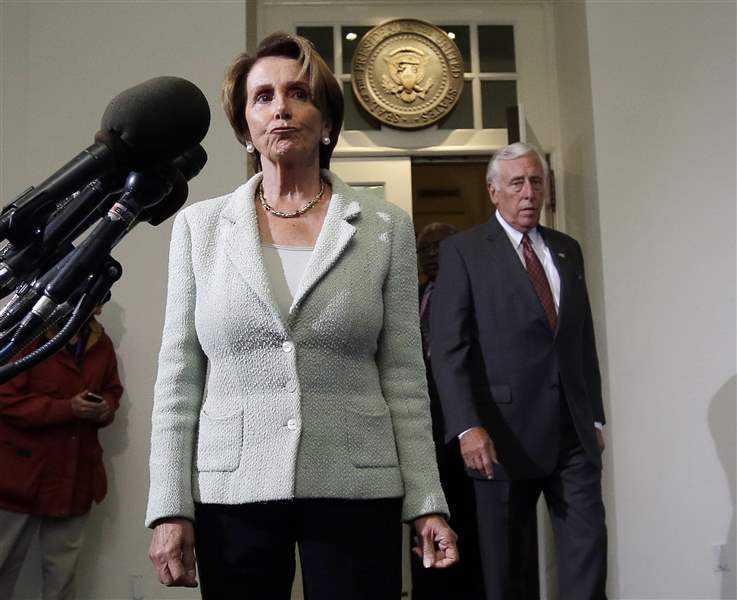
Stocks soar on hopes for deal to avoid U.S. default
10/10/2013
House Minority Leader Rep. Nancy Pelosi, D-Calif., left, and Minority Whip Steny Hoyer, D-Md., right, walk out of the West Wing of the White House to speak to members of the media following their meeting with President Barack Obama, Wednesday, Oct. 9, 2013, in Washington. (AP Photo/Pablo Martinez Monsivais)
ASSOCIATED PRESS
NEW YORK — Stocks soared today, putting the market on track for its second-best day of the year, on news Washington was moving closer to a deal to avert a U.S. government default.
The market has been sharply higher all day. The gains accelerated after House Speaker John Boehner told reporters that the House would take up a short-term extension of the government’s borrowing authority. The proposal gives the two parties time to hammer out a broader agreement.
The Dow Jones industrial average jumped 237 points, or 1.6 percent, to 15,037 as of noon Eastern. It was the Dow’s biggest gain since January.
The Standard & Poor’s 500 index rose 28 points, or 1.7 percent, to 1,685. Only 19 out of the 500 members of the S&P 500 were lower.
The Nasdaq composite index added 72 points, or 1.9 percent, to 3,751.
A potential compromise between the two political parties could not come soon enough. Treasury Secretary Jack Lew has said repeatedly the U.S. government will hit its borrowing limit on Oct. 17. That would leave the federal government with enough cash to last just a week or two before a default becomes a real risk.
A short-term extension of the debt limit is “the right approach,” said Jack Ablin, who manages $66 billion as chief investment officer at BMO Private Bank.
“It allows politicians to turn down the heat a bit while still keeping the broader issues on the front burner,” Ablin said.
In another bullish signal, small-company stocks rose even more than the rest of the market. Those stocks tend to be riskier than large, well-established companies but can also offer investors greater rewards. A sharp increase in small-company stocks means investors are more comfortable taking on risk. The Russell 2000 index jumped 22 points, or 2 percent, to 1,065. The Russell is 20 points below an all-time high it reached Oct. 1.
The market has been sliding since mid-September as Washington’s gridlock got investors worried that the U.S. could default on its debt and wreak havoc on financial markets. As of Wednesday the S&P 500 index had fallen 4 percent since reaching an all-time high of 1,725 on Sept. 18.
Fidelity Investments, the nation’s largest money market fund manager, said Wednesday it had sold all of its short-term U.S. government debt in an effort to limit money market investors’ exposure to a potential default.
There were hopeful signs in the market for short-term U.S. government debt. The yield on the one-month Treasury bill dropped to 0.20 percent from 0.27 late Wednesday.
The yield had spiked from near zero at the beginning of the month to as high as 0.35 percent Tuesday as investors dumped the bills out of concern that the government might not be able to pay them back when they’re due. Investors demand higher yields when they perceive debt as being risky.
Among stocks making big moves:
— Teva Pharmaceuticals rose $1, or 3 percent, to $40.20 after the generic drug maker announced it was cutting its workforce by 10 percent.
— Ruby Tuesday plunged $1.37, or 18 percent, to $6.18. The restaurant chain reported a wider first quarter loss than expected, citing increased competition a difficult economic climate.
— Citrix Systems dropped $7.49, or 11 percent, to $59.17 after the company warned investors that its third-quarter revenue and profit will miss Wall Street’s expectations.